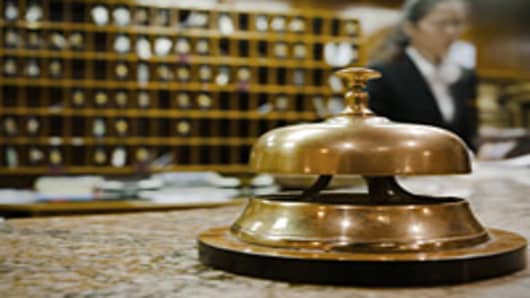Will Corporate America send more of its travelers to cheaper hotels next year?
There's a good chance they will, says Bjorn Hanson, dean of New York University's Tisch Center for Hospitality, Tourism and Sports Management.
Each fall, U.S. companies hash out with hotels over corporate rates and perks for the following year. And, this year, Hanson told us that the two sides are farther apart than normal just before negotiations get underway.
If hotel companies such as Marriott , Hilton, Starwood and Hyatt succeed in obtaining better deals for their properties this year versus a year ago, that could spell trouble for travelers hoping to continue staying in upscale hotels.
That could mean more people staying in a Hampton Inn instead of a Hilton, for example.
It also could mean business travelers will lose old perks that their companies had negotiated during the recession, such as free breakfast or free fitness center use.
If corporate rates go up by the range Hanson expects — about 5 percent to 6.5 percent, "many corp travelers are going to be staying in different hotels than in the last few years," he says.
They'd likely have to check in more often to limited service hotels — the kind that charge less, but ironically, give customers more value such as complimentary breakfast and Wi-Fi.
"Trading down (of hotels) is often rumored; it doesn't happen," Hanson says. "This year may be the beginning of a larger trend."
Are Corporate Rates Important to Consumers?
The outcome of corporate rate negotiations will give us a good indication of where hotel rates are headed on a broader level.
"It's an early indicator, and almost one of the factors considered in setting rates," Hanson says. "Here are knowledgeable travel buyers who are going to set the tone for what they're willing to pay for increases."
During the negotiation process, the buyers come up with innovative ways to negotiate rates, such as throwing in free breakfast at a full-service Marriott or Hyatt restaurant, or including extra fees such as the cost of incoming faxes or use of hotel fitness facilities.
To keep rates lower, travel buyers may be forced to let go of some of those VIP perks, he says.
Two Sides Far Apart
"There's a large difference between what buyers are expecting and what sellers are expecting," he says.
Hanson's informal survey revealed corporate travel managers suspect hotel rates may rise by about 3 percent in most markets to 5 percent in cities such as New York. In contrast, hotel sales executives think demand is strong enough to justify rate increases in the 7 percent to 9 percent range.
"So we have a really big discrepancy, which means it's going to be hard on both sides because they're seeing the world differently," he says.
"The hotel industry is trying to make up for 2009-2011," he says. "And the buyers are saying occupancy is only going to get to about 61 percent, so hotels have 40 percent of their rooms empty so they should want our business."


